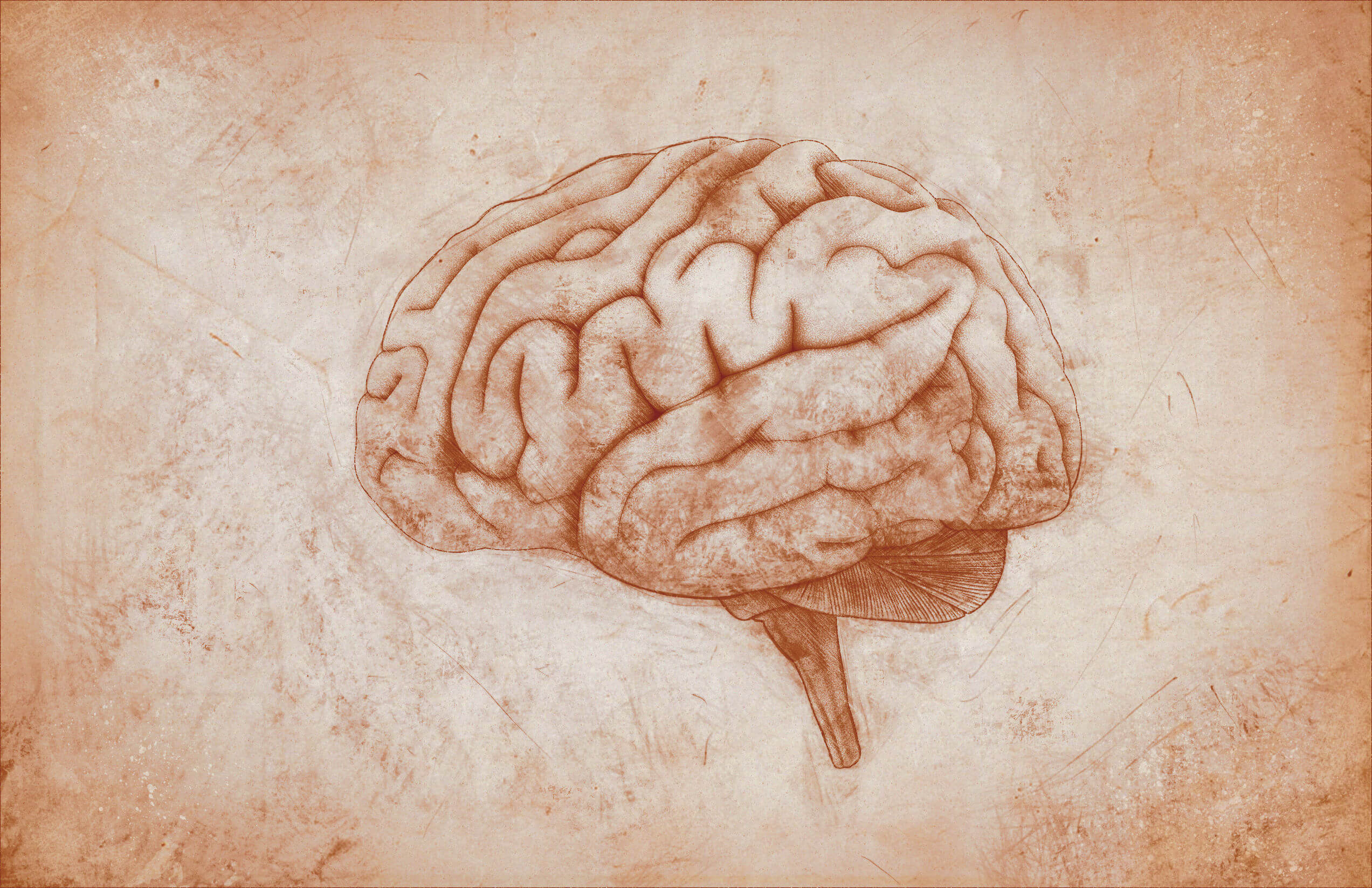What Is Amnesic Syndrome?

Do you know about amnesic syndrome? Do you know what kind of amnesia we’re talking about here? This is defined in an article by Ladera (2001), published in the Journal of Neurology, as an alteration of permanent, stable, and global memory, which occurs as a consequence of an organic brain disorder (brain injury).
So, we can conclude here that the symptoms of this syndrome wouldn’t be explained by any previous cognitive or perceptual deficit (for example, intellectual disability). But what else do we know about this syndrome? How does it alter the different types of memory?
What are its symptoms and its causes? Is there any treatment? We’ll be answering all these questions today!
What is amnesic syndrome?

Amnesic syndrome is defined as the global and permanent memory deficit caused by a brain injury, without any other intellectual or cognitive impairments that affect identity, language etc.
This differentiates amnesic syndrome from dementia, for example, where there’s a deterioration in the cognitive area beyond just memory. In dementia, as we know, there are deficits in other areas, such as language, attention, planning, decision-making…
“We all need memories to know who we are.”
-Guy Pearce-
Symptoms
The most common symptoms of amnesic syndrome are the following:
Anterograde amnesia
This symptom is essential for the diagnosis of an amnesic syndrome. In all cases, anterograde amnesia appears, which is a type of memory loss in which new events aren’t stored in long-term memory.
Because of this, the affected person is unable to generate new memories or new learning.
Retrograde amnesia (not always)
In amnesic syndrome, retrograde amnesia may or may not appear. In this case, we’re talking about the loss of memories prior to the injury, or the inability to access them.
Permanent memory problems
Thus, both the anterograde amnesia and the retrograde amnesia (which doesn’t always appear) – both typical of amnesic syndrome – always affect the permanent memory of the subject.
That is, when they appear, they do so in the continuum of the person’s memory (affecting their life at all times).
Deterioration of different memories
The impairment of the different types of memory occurs in a variety of ways in amnesic syndrome. But are all memories altered in this syndrome? Or is there one that doesn’t? Let’s see it below:
Antegrade memory
Antegrade memory impairment always occurs, in all cases (this is what we call antegrade amnesia). The deterioration occurs both in episodic memory (to a greater extent) and in semantic memory.
Retrograde memory
Impairment doesn’t always occur, that is, retrograde amnesia accompanies antegrade amnesia only in some cases. More specifically, and as occurs with anterograde memory, we’re talking about a deterioration in episodic memory and in semantic memory (to a lesser extent).
Operating memory
Operating memory or working memory, that is, the memory that allows us to temporarily store information and use it to solve certain tasks, is preserved in amnesic syndrome.
Permanent memory
Permanent memory is one that allows us to function in our day-to-day lives, and is related to recent events (retrograde memory) and new learning (anterograde memory). It is always altered (memory in general).
What’s preserved in amnesic syndrome?
Working memory isn’t the only thing that’s preserved in amnesic syndrome. We also know that people can:
- Learn new conceptual categories (as habit learning).
- Show a facilitation and priming effect similar to that of normal subjects, which implies that they remember or recognize concepts better.
- Maintain evaluative learning (a type of implicit learning).
- Acquire new skills and abilities.
Causes
The cause of amnesic syndrome is a brain injury. However, this, in turn, can be caused by different factors. Thus, among the different causes of amnesic syndrome, we find:
1. Korsakoff syndrome
Korsakoff syndrome, also called Korsakoff psychosis, is a condition that encompasses the mental disorders that occur in Wernicke’s disease and that are often present where there is an addiction to alcohol. Chronic consumption of this substance is capable of producing several different effects on the brain.
It’s a syndrome that affects memory and learning, as well as other cognitive functions.
In fact, Korsakoff syndrome is the most common organic cause of amnesic syndrome. At a brain level, these patients suffer lesions in the mammillary bodies and in the dorso-medial nuclei of the thalamus.
Two phases of Korsakoff syndrome

Korsakoff syndrome is usually divided into two phases, and in each of them the memory disorders derived from amnesic syndrome appear differently:
- Acute phase (Wernicke encephalopathy): Mental confusion, nystagmus (abnormal eye movements), prosopagnosia (inability to recognize faces), disorientation, apathy, attention, and memory problems appear.
- Chronic phase (Korsakoff syndrome): there’s a profound memory disturbance with clarity of consciousness.
In the second phase, the chronic phase, the so-called “symptomatic tetrad” of Korsakoff syndrome also occurs. The following symptoms can occur:
- Amnesia regarding recent events.
- Spatial and especially temporal disorientation.
- Some degree of collusion.
- Occasionally false acknowledgments.
2. Damage to the temporal lobe
Another cause of amnesic syndrome is an involvement of the temporal lobe. This affectation, in turn, can be caused by different causes:
- Herpes encephalitis.
- Damage to certain limbic structures: hippocampus, amygdala, uncus…
3. Cerebrovascular accident (CVA)
A stroke is another possible cause of amnesic syndrome. A stroke is a medical condition whereby the blood flow to the brain causes cell death. Thus, in a stroke, the flow of blood to a certain part of the brain stops.
When it occurs due to a rupture of the blood vessels we speak of cerebral hemorrhage (or hemorrhagic stroke), and when it occurs due to a blockage of the same (which prevents the blood from distributing normally) we speak of an ischemic stroke or cerebral infarction.
4. Other causes
More causes that explain the appearance of amnesic syndrome are suffering from anoxia (an almost total lack of oxygen in a tissue) and other organic causes.
Treatment
There’s no specific treatment for amnesic syndrome. At a medical level, what’s usually done is to identify and treat the organic cause that explains the symptoms of amnesic syndrome. Thus, an attempt is made to avoid further complications derived from the syndrome.
On the other hand, other types of treatments are also used:
Occupational therapy
Through occupational therapy, the person is taught to develop strategies to help compensate for memory disorders. Thus, we work on the autonomy and empowerment of the patient so that they can lead as normal a life as possible.
Psychological therapy
Psychological therapy is recommended, above all, in cases where there’s an important psychological component involved in the amnesic syndrome.
It’s also suitable for treating the psychological symptoms derived from it, such as anxiety, depression, low self-esteem, difficulties in interpersonal relationships…
Cognitive rehabilitation
From a more neuropsychological area, cognitive rehabilitation is used. This type of intervention encompasses a series of techniques that are used in order to compensate or improve the patient’s cognitive deficit (in this case, the memory deficit).
It consists of different types of activities and exercises (digital and by hand) that seek to stimulate these cognitive deficit areas.
Amnesic syndrome is a condition that involves a series of memory disorders. Anterograde amnesia always appears (the inability to record new information) and, in some cases, retrograde amnesia (the inability to remember past events).
Its causes are diverse, although they always have to do with some type of brain injury. Temporal lobe involvement is intrinsically related to this syndrome, and its most common organic cause is Korsakoff syndrome.
“Just because I don’t remember certain things, it doesn’t make my actions meaningless.”
-Guy Pearce-
Do you know about amnesic syndrome? Do you know what kind of amnesia we’re talking about here? This is defined in an article by Ladera (2001), published in the Journal of Neurology, as an alteration of permanent, stable, and global memory, which occurs as a consequence of an organic brain disorder (brain injury).
So, we can conclude here that the symptoms of this syndrome wouldn’t be explained by any previous cognitive or perceptual deficit (for example, intellectual disability). But what else do we know about this syndrome? How does it alter the different types of memory?
What are its symptoms and its causes? Is there any treatment? We’ll be answering all these questions today!
What is amnesic syndrome?

Amnesic syndrome is defined as the global and permanent memory deficit caused by a brain injury, without any other intellectual or cognitive impairments that affect identity, language etc.
This differentiates amnesic syndrome from dementia, for example, where there’s a deterioration in the cognitive area beyond just memory. In dementia, as we know, there are deficits in other areas, such as language, attention, planning, decision-making…
“We all need memories to know who we are.”
-Guy Pearce-
Symptoms
The most common symptoms of amnesic syndrome are the following:
Anterograde amnesia
This symptom is essential for the diagnosis of an amnesic syndrome. In all cases, anterograde amnesia appears, which is a type of memory loss in which new events aren’t stored in long-term memory.
Because of this, the affected person is unable to generate new memories or new learning.
Retrograde amnesia (not always)
In amnesic syndrome, retrograde amnesia may or may not appear. In this case, we’re talking about the loss of memories prior to the injury, or the inability to access them.
Permanent memory problems
Thus, both the anterograde amnesia and the retrograde amnesia (which doesn’t always appear) – both typical of amnesic syndrome – always affect the permanent memory of the subject.
That is, when they appear, they do so in the continuum of the person’s memory (affecting their life at all times).
Deterioration of different memories
The impairment of the different types of memory occurs in a variety of ways in amnesic syndrome. But are all memories altered in this syndrome? Or is there one that doesn’t? Let’s see it below:
Antegrade memory
Antegrade memory impairment always occurs, in all cases (this is what we call antegrade amnesia). The deterioration occurs both in episodic memory (to a greater extent) and in semantic memory.
Retrograde memory
Impairment doesn’t always occur, that is, retrograde amnesia accompanies antegrade amnesia only in some cases. More specifically, and as occurs with anterograde memory, we’re talking about a deterioration in episodic memory and in semantic memory (to a lesser extent).
Operating memory
Operating memory or working memory, that is, the memory that allows us to temporarily store information and use it to solve certain tasks, is preserved in amnesic syndrome.
Permanent memory
Permanent memory is one that allows us to function in our day-to-day lives, and is related to recent events (retrograde memory) and new learning (anterograde memory). It is always altered (memory in general).
What’s preserved in amnesic syndrome?
Working memory isn’t the only thing that’s preserved in amnesic syndrome. We also know that people can:
- Learn new conceptual categories (as habit learning).
- Show a facilitation and priming effect similar to that of normal subjects, which implies that they remember or recognize concepts better.
- Maintain evaluative learning (a type of implicit learning).
- Acquire new skills and abilities.
Causes
The cause of amnesic syndrome is a brain injury. However, this, in turn, can be caused by different factors. Thus, among the different causes of amnesic syndrome, we find:
1. Korsakoff syndrome
Korsakoff syndrome, also called Korsakoff psychosis, is a condition that encompasses the mental disorders that occur in Wernicke’s disease and that are often present where there is an addiction to alcohol. Chronic consumption of this substance is capable of producing several different effects on the brain.
It’s a syndrome that affects memory and learning, as well as other cognitive functions.
In fact, Korsakoff syndrome is the most common organic cause of amnesic syndrome. At a brain level, these patients suffer lesions in the mammillary bodies and in the dorso-medial nuclei of the thalamus.
Two phases of Korsakoff syndrome

Korsakoff syndrome is usually divided into two phases, and in each of them the memory disorders derived from amnesic syndrome appear differently:
- Acute phase (Wernicke encephalopathy): Mental confusion, nystagmus (abnormal eye movements), prosopagnosia (inability to recognize faces), disorientation, apathy, attention, and memory problems appear.
- Chronic phase (Korsakoff syndrome): there’s a profound memory disturbance with clarity of consciousness.
In the second phase, the chronic phase, the so-called “symptomatic tetrad” of Korsakoff syndrome also occurs. The following symptoms can occur:
- Amnesia regarding recent events.
- Spatial and especially temporal disorientation.
- Some degree of collusion.
- Occasionally false acknowledgments.
2. Damage to the temporal lobe
Another cause of amnesic syndrome is an involvement of the temporal lobe. This affectation, in turn, can be caused by different causes:
- Herpes encephalitis.
- Damage to certain limbic structures: hippocampus, amygdala, uncus…
3. Cerebrovascular accident (CVA)
A stroke is another possible cause of amnesic syndrome. A stroke is a medical condition whereby the blood flow to the brain causes cell death. Thus, in a stroke, the flow of blood to a certain part of the brain stops.
When it occurs due to a rupture of the blood vessels we speak of cerebral hemorrhage (or hemorrhagic stroke), and when it occurs due to a blockage of the same (which prevents the blood from distributing normally) we speak of an ischemic stroke or cerebral infarction.
4. Other causes
More causes that explain the appearance of amnesic syndrome are suffering from anoxia (an almost total lack of oxygen in a tissue) and other organic causes.
Treatment
There’s no specific treatment for amnesic syndrome. At a medical level, what’s usually done is to identify and treat the organic cause that explains the symptoms of amnesic syndrome. Thus, an attempt is made to avoid further complications derived from the syndrome.
On the other hand, other types of treatments are also used:
Occupational therapy
Through occupational therapy, the person is taught to develop strategies to help compensate for memory disorders. Thus, we work on the autonomy and empowerment of the patient so that they can lead as normal a life as possible.
Psychological therapy
Psychological therapy is recommended, above all, in cases where there’s an important psychological component involved in the amnesic syndrome.
It’s also suitable for treating the psychological symptoms derived from it, such as anxiety, depression, low self-esteem, difficulties in interpersonal relationships…
Cognitive rehabilitation
From a more neuropsychological area, cognitive rehabilitation is used. This type of intervention encompasses a series of techniques that are used in order to compensate or improve the patient’s cognitive deficit (in this case, the memory deficit).
It consists of different types of activities and exercises (digital and by hand) that seek to stimulate these cognitive deficit areas.
Amnesic syndrome is a condition that involves a series of memory disorders. Anterograde amnesia always appears (the inability to record new information) and, in some cases, retrograde amnesia (the inability to remember past events).
Its causes are diverse, although they always have to do with some type of brain injury. Temporal lobe involvement is intrinsically related to this syndrome, and its most common organic cause is Korsakoff syndrome.
“Just because I don’t remember certain things, it doesn’t make my actions meaningless.”
-Guy Pearce-
- Belloch, A., Sandín, B., Ramos, F. (2008). Manual de psicopatología. Madrid: McGraw-Hill.
- Berrios, G. Trastornos orgánicos en psiquiatría. En Fuentenebro, F.; Vázquez, C. (1990). Psicología médica, psicopatología y psiquiatría. Interamericana McGraw-Hill, Madrid.
- Carlson, N.R. (1999). Fisiología de la conducta. Barcelona: Ariel Psicología.
- Carrillo-Mora, P. (2010). Sistemas de memoria: reseña histórica, clasificación y conceptos actuales. Revista de Salud Mental, 33 (1), 85-93.
- Delgado, J.M.; Ferrús, A.; Mora, F.; Rubia, F.J. (eds) (1998). Manual de Neurociencia. Madrid: Síntesis.
- Ladera, V. (2001). Post-traumatic amnesia syndrome. Revista de Neurología, 32(5): 467-72.
Este texto se ofrece únicamente con propósitos informativos y no reemplaza la consulta con un profesional. Ante dudas, consulta a tu especialista.







